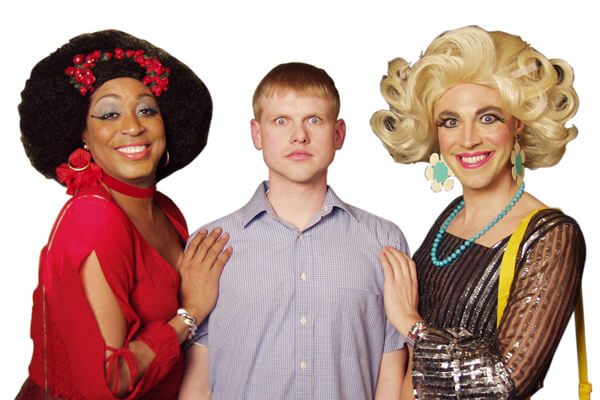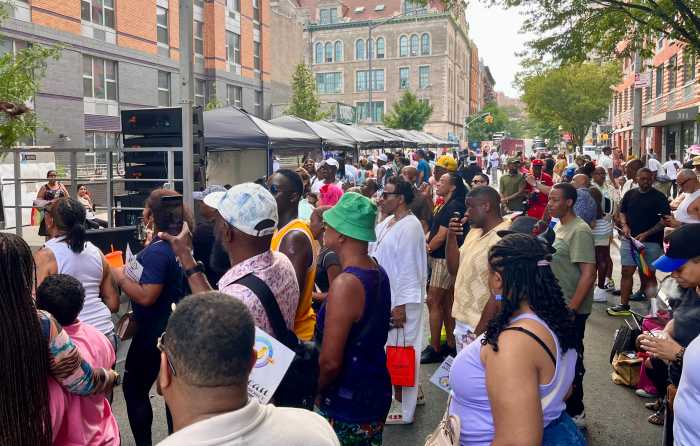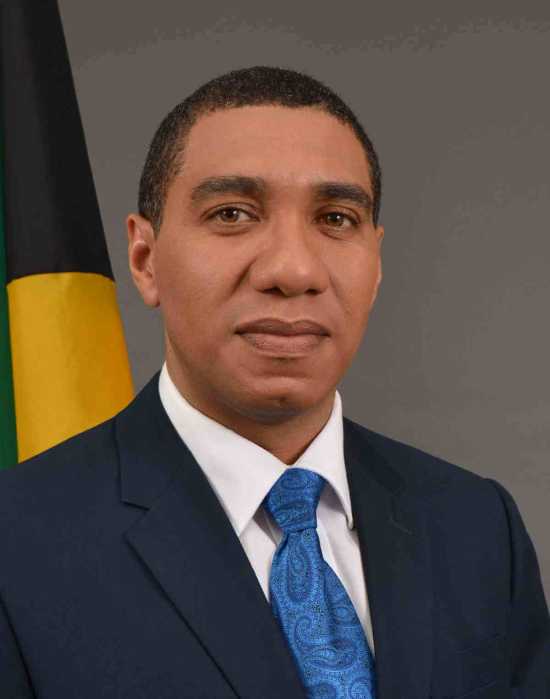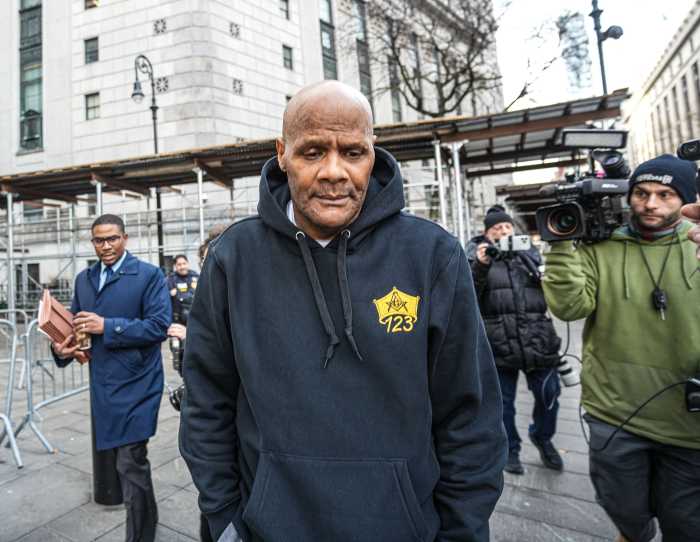Michael Lynch, Jamison Lee Driskill, and Chris Andersson in the 2002 Eagle bar production of “Street Theater.” | BARRY CHILDS/ TOSOS
A generation (or two, or three) has grown up since the first bottle was thrown, the first billy club came down at the Stonewall, and it’s now an historic event, a symbol, the recognized start of an era. As the witnesses have inevitably departed the scene, they’ve left behind their stories in books, films, and in Doric Wilson’s case, his rowdy, in your face, piece of street theater called “Street Theater.”
TOSOS (The Other Side of Silence), the theater founded by Wilson in 1974, and reimagined in 2002 by Wilson, Barry Childs, and Mark Finley, will present a benefit performance of “Street Theater” at the LGBT Community Center on June 28, the 43rd anniversary of the first night of the Stonewall rebellion. Wilson, the playwright, activist, and leatherman, passed away last May, but his work lives on.
Finley directs the latest performance, bringing the motley crew of street people, drag queens, cops, butches, hippies, and everyone else on Christopher Street that night into focus again with a play that has helped define his own career. Yet, it’s a play he didn’t know until he met Doric Wilson in 2001. Finley spoke to Gay City News about what “Street Theater” meant — and means — to him and the community.
KATHLEEN WARNOCK: When did you first hear of “Street Theater”?
MARK FINLEY: I had never heard of it until I met Doric Wilson. My friend Robert Locke is a jazz singer; he met Doric at William Hoffman's birthday party, where he was singing. He said, “I met this guy who was one of the founders of Off-Off Broadway theater and the Caffe Cino. He knows all about it because he was there! You have to meet him!”
Two weeks later, I did. We got to talking about theater and before I knew it, it was 3:30 in the morning. The next day Doric called me and said he wanted me to be his director. I said, “Don't you want to see some of my work first?” And he said no, he'd met me and he felt like I was doing theater for the right reasons and he wanted me to be his director. He gave me “Street Theater,” and I decided to produce a reading of it [at the Abington Theatre]. We did it with 14 actors stretched across a little two-sided stage in a big L-shape. I gave everyone a seat assignment and had them stand when they were on stage and sit when they were offstage, so the audience would get the impression of who's talking to who and how many people were in the scene at any given time. It worked well, and it made us eager to take it one step further.
The most famous production was in the early ‘80s at the Mineshaft bar. It was set up runway-style, with the audience on two sides of the stage and the actors playing to all sides. [After the Abingdon reading,] Doric wanted to do it at a bar that would run it at 7 or 8 o’clock. The bar could sell drinks when they're usually dead, and we could do our play. He found a home for the play at the Eagle bar. When we re-started TOSOS, it was our cornerstone production. We did it in the spring of 2002, and as artistic director, I got to direct it.
KW: What things did Doric tell you that added to your understanding, gave you ideas about how to stage the play?
MF: Doric convinced me to use the runway staging. At first I couldn't see it at all. But as I blocked it and got it up on its feet, I started to see that that's the ideal way to do it. The play has the air of a Thornton Wilder play with its asides to the audience and its characters stepping in and out of the action — until the action takes control of the play. This staging puts the audience in the play — not in an icky audience participation way — and when characters speak directly to them it seems very natural, as if they're speaking to another person on the street that fateful night.
KW: How did you cast it?
MF: Our first production as TOSOS was for a reading series of overlooked LGBT plays at the Center called “LOOK AGAIN!” We needed a ton of actors so we put ads in Backstage, asked friends, asked friends of friends… Michael Lynch had done the ill-fated Off-Broadway production of “Street Theater” — the one that the Minetta Creek flooded and it closed prematurely. He came back to reprise his role as Boom Boom. He's done every production of “Street Theater” I've directed. As has Chris Andersson, who plays his street queen cohort Ceil.
KW: How have you brought it back since?
MF: After the six-week run at the Eagle, they asked us back the following year. TOSOS was, at that point, starting to grow exponentially, and we had more productions going than we could fund or staff, but we kept doing them because that's how we roll. We kept talking about remounting it, but a show with 14 actors for a theater with a big reputation and a tiny bank account had to be put on the back burner.
Three years ago, Doric was asked to be one of the grand marshals of the Gay Pride Parade. The Center honored him as a gay living legend and hit us with the idea of doing a one-night performance of the play. We were thrilled not only to be doing the play again, but also to be back at the Center. The play was such a hit, the Center asked us back before the intermission. Sadly, Doric didn't live to see that production. He passed away last May, but he was so thrilled with the cast and couldn't stop talking about it. Knowing Doric and ignoring his health, I honestly thought there was no way he wasn't going to be there.
KW: What do you remember most about last year’s performance?
MF: Doric died last May, the night before a reading in our Chesley/ Chambers Playwrights Project. He didn't miss readings. Period. And we knew he was particularly excited to see this one: a play by the brilliant Josh Conkel. When he didn't show up we felt like something was wrong. And it was. But ironically we — TOSOS, his theater family — were all together when we got the news. I'll never forget sitting in that rehearsal room with everyone thinking about how unbelievable it was that Doric was gone. As devastated as we were, there was no way “Street Theater” was not happening. A month later, it was a charged evening, to say the least. We have a tradition at TOSOS. We dedicate performances to those we love. “Street Theater” that night was for Doric. In my curtain speech, I choked out that I had asked Doric, “Why don't you write a memoir?” And he said he'd much rather his work spoke for him. And boy, did it! I don't think anyone in that audience left unmoved. The ending was absolutely electric. And speaking of electric, there was a storm brewing outside as the show was getting ready to start, and it hit just after we began. There were loud cracks of thunder through the first act. That's my favorite part of the last time we did “Street Theater.” Even though we all missed Doric like crazy, we were smiling because the thunder made us feel like he hadn't gone at all.
KW: Did Doric tell you what he thought the play’s life should be? Did he see it as a play that still had something to say to gay people — or anyone else — today?
MF: Doric always felt like this play could run and run. He felt — and I agree — that the play speaks for itself.
KW: What do you think it still has to say?
MF: I think it has a ton to say to gay people. I live in Hell's Kitchen, and I think of this play every time I see two guys walking down the street holding hands or kissing. That's great! But it didn't just happen. Those rights don't just come with your exorbitant Manhattan rent. They came from somewhere. The characters in “Street Theater” don't have them at the beginning of the play. They don't have them at the end of the play. But for the first time, they feel like they deserve to have them. It all starts here. That's the genius of the play. It's funny. Very funny. Until it's not funny any more.
The characters — according to Doric — aren't actual people, they're combinations, so it saves itself from being preachy, maudlin, or too “real.” That's what is says to any audience: “We're people.” Ew! I just grossed myself out. But it's true. And people respond to that — with laughter (and comedies don't lie; you can tell instantly if you're reaching them or not) and the spontaneous standing O at the end.
KW: What’s your favorite thing about directing the play?
MF: I've been lucky enough to have “Street Theater” vets — people who have done this show with me again and again and I love working with them. I also have been lucky enough to work with some very talented actors, both veterans of the show and new ones, and every time we do this, it's always so fantastic to rediscover the play through them — see how it fits on them and knowing I had something to do with that part of it. My least favorite thing is scheduling 14 actors. Are you kidding?
KW: I know you’d like to see this play run. What kind of venue would be ideal?
MF: I have always wanted to see “Street Theater” done every Pride Month as an annual event. When I was kid, “The Wizard Of Oz” came on TV every spring, and I've always wanted “Street Theater” to be the officially gay version of that. I agree with Doric. I would love to have it run in a non-traditional space with this runway staging. In a bar maybe? Like, I don't know… the Stonewall? I would also to tour it to college campuses and theaters all over the country. There are gay people outside of New York City. They might like to see a play about one of the places in this country where the rights we now have in New York got their start.
KW: In light of all the changes that have taken place since this play was written, what parts still resonate? What parts get the biggest laughs?
MF: Society may have changed on the surface, but the people that make up that society are slower to evolve. People are always going want to judge, marginalize, and take advantage of other people. I think here we get a chance to be appalled at it and laugh at it. Perhaps people are apt to distance themselves from the time and laugh in a “can you believe it?” kind of way. Hands down, the drag queens always get the biggest laughs. In the most unexpected ways. You get something unexpected from a drag queen? That's funny!
We're so happy to be back at the Center. I think Doric would be happy about that. Doric declaiming, “You can’t run a show during Pride! People don't want to see shows during Pride” is indelibly scratched across my memory. I think it's fantastic that weplay the night of June 28, the anniversary of the first night of the Stonewall riots.
The scripts of “Street Theater” and several other Doric Wilson plays are available from United Stages (unitedstages.com/scriptInfo.php). For more information on Wilson’s life, visit doricwilson.com. Kathleen Warnock is a playwright and editor whose play “Outlook” was recently featured at the International Dublin Gay Theatre Festival, in a production directed by Mark Finley.
STREET THEATER | A play by Doric Wilson | Directed by Mark Finley | LGBT Community Center | 208 W. 13th St. | Jun. 28 at 7:30 p.m. | $20 at gaycenter.org/node/7936 | $25 at the door | Proceeds benefit TOSOS and the Center






































